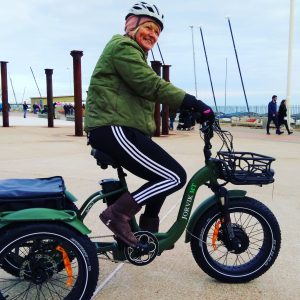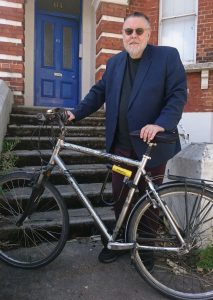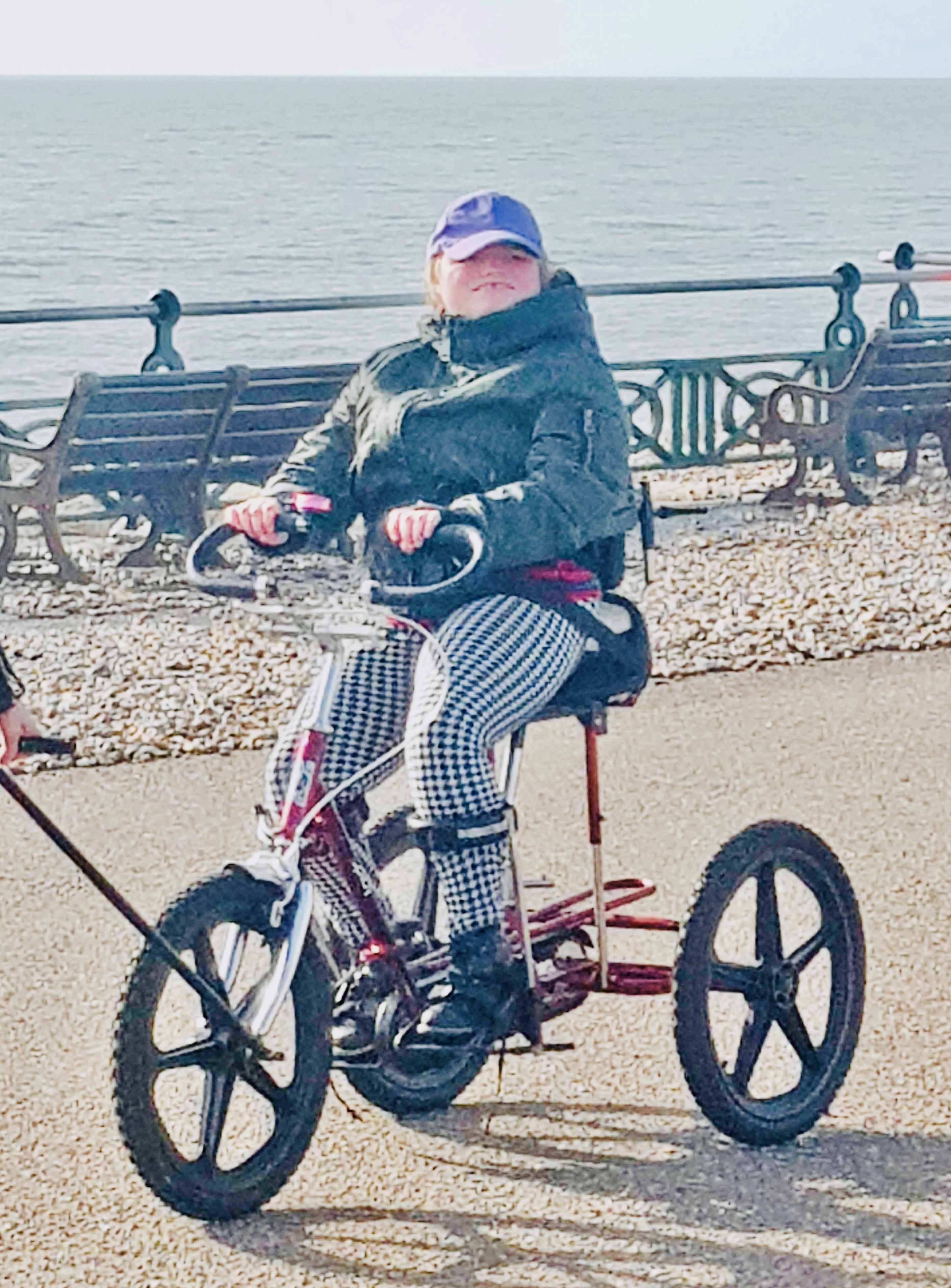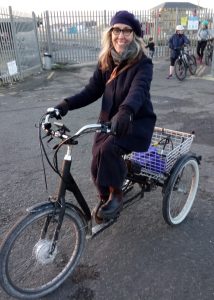Cycling is booming, as it’s a cheap, socially distanced way of getting around that’s fun and gives you exercise. Great if you’re young and athletic, but what if you’re older, disabled or have health problems?

According to disabled cycling charity Wheels For Wellbeing, increasing numbers of disabled people are cycling, as it aids mental and physical health and provides independence.
The biggest barrier is lack of facilities, including safe cycle lanes and secure storage.
Bricycles, the Brighton and Hove Cycling Campaign, is doing its best to promote cycling for people of all ages and mobilities, and has spoken with a number of people who enjoy the freedom, convenience and health benefits of cycling.
Heloise Peligry, 27, is unable to walk unaided. She has been cycling since she was six, when her mums Claire and Lizzie got her an adapted trike through charity Whizz-Kidz.
Lizzie said: “Heloise loves cycling along the seafront. Because she’s higher up than in her wheelchair, she feels part of the community. And the exercise is great for her physical and mental health.
“She needs help steering but pedals herself – and balance is not an issue as her legs and trunk are supported.
“Getting her on the trike can be tricky and we’re looking forward to the new Inclusive Cycle Hub, which will have a hoist.
“We could do with secure cycle storage in town as it would save us having to transport the trike in our car.
“With the right equipment and infrastructure we can really open up life for our disabled daughter.”

Amanda Massey broke her neck in an accident and uses an electric trike to get around. She said: “I used to cycle regularly until I became disabled.
“I live off the Old Shoreham Road and as soon as I saw them putting in the temporary lanes, I got my e-trike.
“I use the cycle lanes a lot and I love to see kids using them to get to school. I drive too – I’m a blue badge holder – so I see things from various perspectives.
“I’m really proud of my new trike and of Brighton and Hove City Council for their response to keeping us all safe and mobile.
“Enablism is everything for people like me and the wider community.”

Sculptor Chris Macdonald, 82, gets around town on his bright orange electric bike. He said: “On foot, I can do about 400 metres before my arthritis makes me stop, so my bike is a lifesaver.
“On the bus, it can take up to an hour to get to the hospital, but by bike it’s a guaranteed 20 minutes. Journeys are easier and more enjoyable by bike, plus I get exercise.
“We could do with more protected cycle lanes as sometimes motorists beep at me angrily for going slowly.
“Having an electric bike means I don’t need a mobility scooter and I get to look cool at the same time!”
Nikki Ward has MS. She used to be a mobile hairdresser, using her bike, but stopped cycling when a relapse led to a loss of strength and balance.
She said: “It took me a while to get my electro-assist trike, as they’re not cheap, but my aunt helped me buy it.
“We also had to get work done on the house to accommodate it – cycle storage is difficult in Brighton.
“I no longer cycle for work – I’m now an artist – but go out on my trike nearly every day and do about 15 miles.
“My favourite routes are the Undercliff Path to Rottingdean and through the locks to Shoreham.
“Because my trike has a big basket, I can do a weekly shop without problems. I live in a hilly part of Brighton, so the electro-assist is essential! I love my trike – it’s my freedom.”

Todd Arnold suffers from a neurological illness, which means he has problems with balance, and has osteoarthritis in one knee.
He said: “On my bike, I don’t have problems balancing, and there’s no weight on my knee, meaning it’s easier to cycle than walk.
“Physical exercise really helps my mood and it’s a good way to lose weight. Cycling makes me feel free, and gives me a wonderful sense of achievement.
“Lockdown was stressful, but it was magical to cycle along the Lewes Road and see it empty of cars for minutes at a time. Cycling is a big part of my life.”
Chris Williams is project officer at the Brighton and Hove cycling campaign group Bricycles.











Still struggling to see why this city does not embrace the e scooter, suitable for many with mobility issues, (you even get some with a seating option). They are a fraction of the cost of an adapted trike or e bike. Legal and widely used across Europe and the U.S. we seem to have a myopic view in the city of bike, bike, bike – there is another cheaper and more efficient option for many without using the car.
“we seem to have a myopic view in the city of bike, bike, bike”
I think you mean car, car, car.
BTW in the UK e-scooters are illegal to use on public roads, in cycle lanes and on the pavement. They are being trialed in some cities at the moment.
Also, this article is about the exercise benefit of riding a bike. E-bikes aren’t throttled, they’re electric-assisted, so you put the effort in that you want to, making them great for people with mobility issues.
Point proved – totally dismissed e scooters, (which will be legal next year). E bikes are 4 to 5 times the price of an e scooter and only obtainable for those with sufficient funds – denying a vast majority that want to cycle.
The people in this article would struggle to balance on an e-scooter. E-scooters require much more dexterity to operate than bicycles.
E-scooters also do not provide exercise.
This article is about people who find freedom and joy cycling. It seems that many of the people commenting have some kind of ideological problem with bicycles and are going out of their way to find reasons for others not to use them. You may not want to ride a bike yourself, but why try and stop others from using them? This is an extremely negative attitude. What does it achieve?
Some e scooters come with a seat and despite perception are easy to balance, (obviously some will not be able to balance). Bikes are great but not for everyone. If we want people out of their cars we should embrace all the possibilities not pin hopes on just cycling. What’s negative at looking at all possibilities and some that are very affordable.
The biggest barrier to disabled cycling is the cost of the adapted bikes or trikes which can run into thousands. Even more expensive for children as they can quickly outgrow specially adapted equipment. The biggest difference for those with mobility needs who want to, and are able to cycle (because many cannot), is to encourage the government to try and reduce this cost – then look at cycle lanes etc. Cart before the horse….
The anti-cycling brigade have descended on an article about disabled people. Beyond belief.
I hope your not referencing me – someone who uses the sea front cycle lane 5 days a week, (but yes I am no fan of the A270 cycle lane but certainly NOT anti cycling not all cycle lanes work). Having used Whizz Kids to fund a trike for my son many years ago, (and being a governor at a special school for 12 years), I know the cost of adapted cycles and trikes and that is the biggest issue. It’s also curious how NO ONE mentioned disabled cyclists until issues cropped up over Blue Badge parking and the impact street closures and one cycle lane had on Blue badge users. It’s wonderful that some can cycle but we must never forget that nearly all of the 13500 blue badge users in the city cannot and if we fail them we fail full stop.
Disabled cyclists are frequently discussed but advocacy groups? You may have seen more mention of disabled cyclists as one of the big complaints against cycle lanes by motoring groups is that they are not inclusive and that they specifically disadvantage disabled people with the added comments about how ‘not everyone can cycle’. And whilst it’s true, not everyone can drive either, so redressing the balance is key.
Can you share the data behind the comment about nearly all blue badge holders can’t cycle? I assume you have a good source given your experience with working with a special needs school. I don’t think I’ve seen that sort of break down and I’m genuinely interested.
I’ve no idea what the breakdown is, but I have two blue badge holders in a short stretch of the street where I live. Both have mobility issues affecting their hips, back and legs in particular and, from the looks of it, the muscle deterioration that goes with age as well as the mobility limitations resulting from their bones/joints. Both are as sharp as pins mentally and as active as their bodies allow. Without their blue badges, both would be much more isolated. I use my bike to run small errands for one of them as every outing for her is time-consuming, painstakingly planned and often painful even by car.
Also anecdotally, neither of my grandparents were drivers, but from the age of about 60 onwards, my grandfather could not have cycled because of the unseen cancer easting him from the inside. Shuffling to a waiting cab was hard enough and, in those days, getting in and out was also painful as we didn’t have disabled-friendly cabs. My grandmother was as fit as a fiddle until she needed surgery on fused bones in her lower back in her 50s. It didn’t work as well as she would have liked and her sitting room had to be turned into a bedroom as she could no longer make it up the stairs. She relied on taxis and friends with cars so that she could get around Brighton during her remaining 20 years.
Personally speaking, I do not know anyone with a blue badge whose mobility is sufficient to make cycling a viable alternative, but I’m glad the author has highlighted the examples above and I wish them all well.
As someone who cycles and drives, I find it frustrating to keep hearing some decry those with insights to offer as pro this or anti that. There are a lot of simplistic comments under this type of story from people who are perhaps lucky enough not to have to deal with disability day in day out.
good to see disabled people making use of e bikes or scooters or whatever. they are in the tiny majority however. the majority shoud be legislated for – the lazy fat sausage legged scumbags, that jump in their cars to pick up a pint o milk or fetch and gobble a burger instead of taking the trouble to walk 100 yards and save their bulging and expanding horrendous waistlines – how they mange to copulate is beyond comprehensions
When someone is as obnoxious about his fellow human beings, and so obviously lacks insight into the myriad of circumstances that mean driving is the sensible choice for them, they really shouldn’t be commenting on this sort of article. The only person I know who went such a short distance by car was John Prescott.